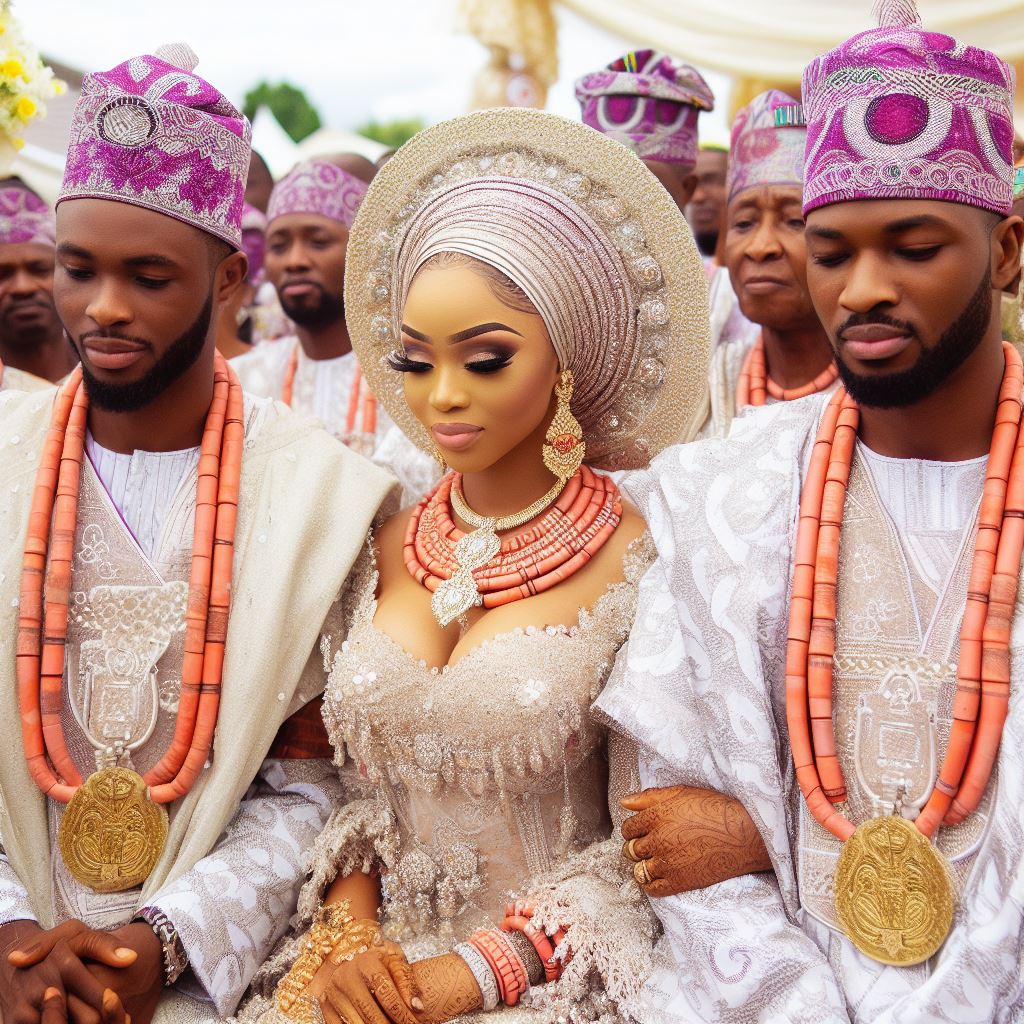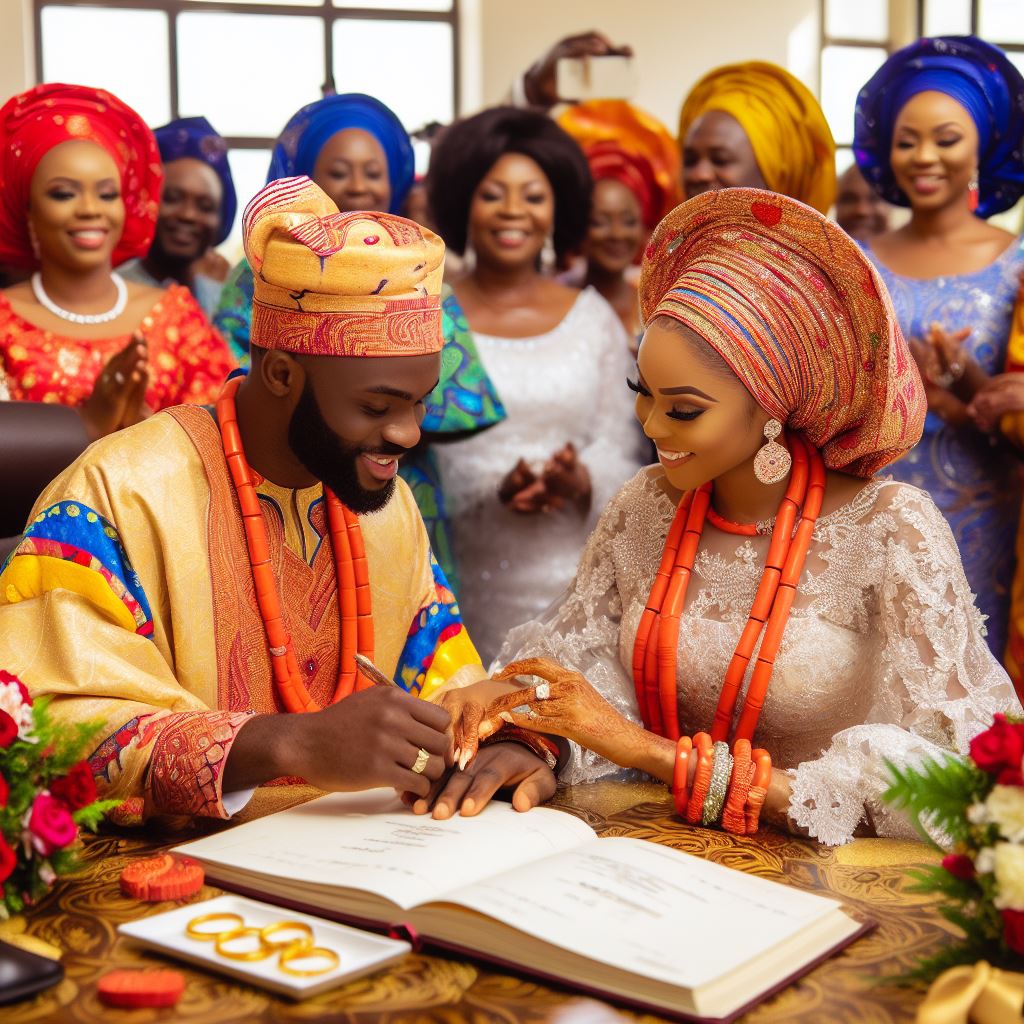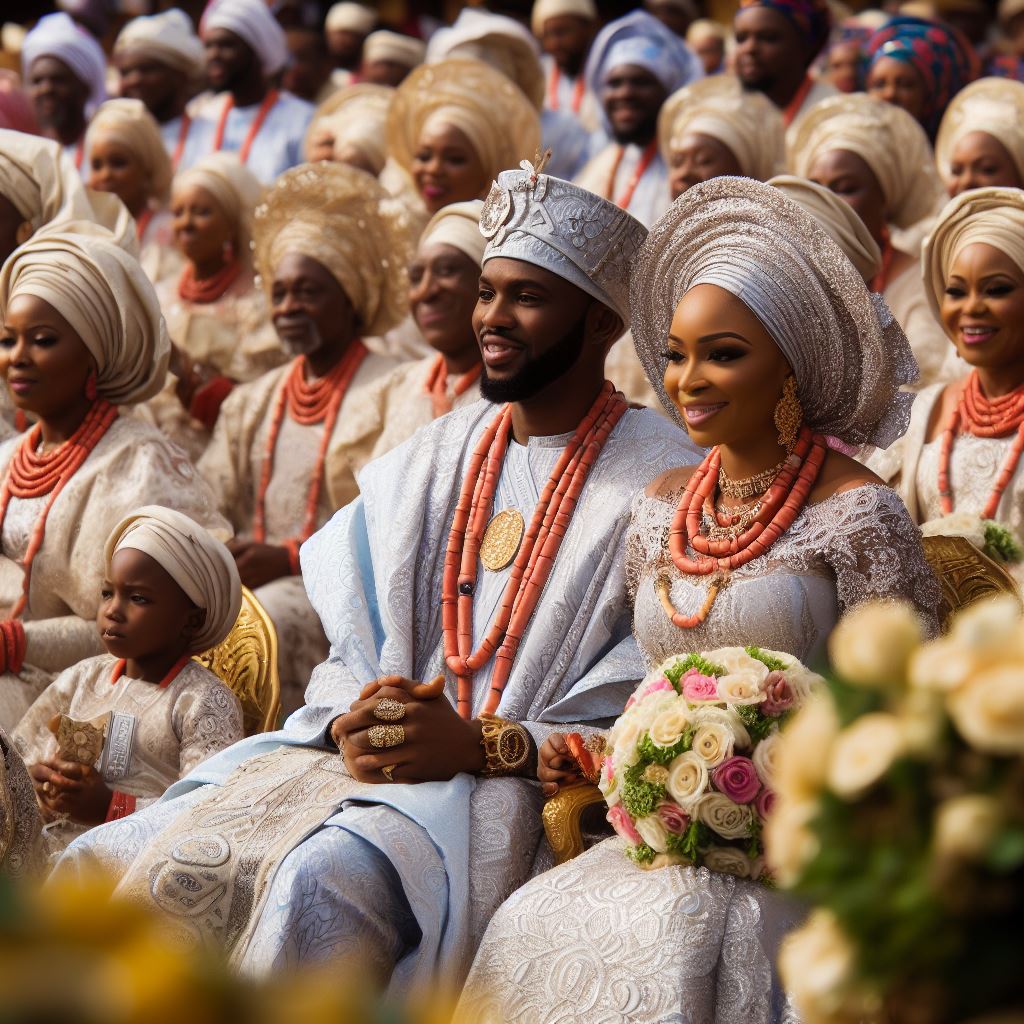Introduction
Polygamous marriages in Nigerian culture hold a prominent place, deeply rooted in tradition and history.
They have been practiced for centuries and continue to be a prevalent family structure in the country.
The significance of polygamy in Nigeria is multi-faceted.
It serves as a way to expand families, share responsibilities, and enhance social status.
In many Nigerian societies, the more wives a man has, the more prosperous and respected he is considered.
This blog post aims to delve into the intricate dynamics of polygamous marriages in Nigeria, shedding light on their impact on family dynamics, gender roles, and societal norms.
We will explore the challenges and benefits faced by those involved in such marriages and consider the evolving attitudes towards polygamy in modern Nigerian society.
Historical context
Polygamy has deep historical roots in Nigerian culture, stemming from ancient practices and customs.
The tradition of having multiple wives has been prevalent for centuries, and it has been shaped by various cultural and religious factors.
1. Historical Roots of Polygamy
- Polygamy in Nigeria can be traced back to pre-colonial times, with evidence from historical records and archaeological findings.
- Many Nigerian tribes, such as the Yoruba, Hausa, and Igbo, embraced polygamy as an integral part of their social structure and identity.
- The practice was often seen as a symbol of wealth, power, and prestige, as men who could afford to support multiple wives were highly regarded in their communities.
2. Cultural and Religious Factors
- Nigerian culture places significant emphasis on family and community, and polygamy is seen as a means to strengthen these bonds.
- Islam, which arrived in Nigeria in the 9th century, plays a crucial role in promoting polygamy, allowing Muslim men to have up to four wives.
- Christianity, which arrived in Nigeria during colonial times, initially frowned upon polygamy but has since become more tolerant, especially in indigenous churches.
- The influence of both Islam and Christianity has helped shape the perception and acceptance of polygamy in Nigerian society.
3. Changes and Adaptations
- Over time, polygamy in Nigeria has undergone certain changes and adaptations in response to social, economic, and legal developments.
- Urbanization and modernization have led to a decline in polygamous marriages, particularly in urban areas where monogamy is becoming more prevalent.
- Economic factors, such as the increasing cost of living and limited resources, have also made it more challenging for men to maintain multiple wives.
- Legal reforms and women’s rights movements have sought to regulate and restrict polygamy, emphasizing equality and the well-being of women and children.
In essence, polygamy has deep historical roots in Nigerian culture, influenced by cultural practices, religious beliefs, and societal norms.
While the tradition has evolved over time, it remains a significant aspect of Nigerian society, although it is now less common due to changing social dynamics.
Understanding the historical context and factors that have shaped polygamy in Nigeria is crucial for comprehending its persistence and the ongoing debates surrounding the practice.
Read: The Legal Requirements of a ‘Marriage by Ordinance’ in Nigeria
Legal aspects
Polygamy has a long-standing tradition in Nigerian culture, and the legal framework surrounding it reflects the cultural significance it holds.
Nigeria recognizes and regulates polygamous marriages under its laws, providing certain protections and rights for wives and children involved.
Overview of the Legal Framework
In Nigeria, polygamous marriages are governed by both statutory and customary laws.
The 1978 Marriage Act regulates monogamous marriages, while the Marriage Act (Chapter 218) recognizes polygamy and provides guidelines for its practice.
Under Nigerian law, a man can enter into multiple marriages simultaneously, as long as he meets certain conditions.
These conditions include being mentally and financially capable of maintaining multiple households and obtaining the consent of the existing wife or wives.
Recognition and Regulation of Polygamous Marriages
Polygamous marriages in Nigeria are valid and legally recognized, provided they comply with the stipulated requirements.
The law ensures that such marriages are conducted in a formal and registered manner before recognized authorities.
When entering into a polygamous marriage, the husband must obtain a marriage certificate specifying the number of wives he intends to marry.
The certificate is then registered with the appropriate marriage registry, ensuring legal recognition, and establishing the rights and responsibilities of all parties involved.
Legal Protections and Rights for Wives and Children
Despite the recognition of polygamous marriages, Nigerian law also provides protections and rights for wives and children within these unions.
The legal framework acknowledges the potential vulnerabilities that may arise and aims to address them.
Wives in polygamous marriages have rights to conjugal and marital rights, including financial support, inheritance rights, and access to conjugal benefits.
Furthermore, they can seek divorce or dissolution of the marriage in case of neglect or mistreatment.
Children born within polygamous marriages are also granted legal rights, such as inheritance rights, parental care, and maintenance.
Nigerian law acknowledges the importance of safeguarding the rights and welfare of children, regardless of the family structure they are born into.
It is essential to note that the legal protections and rights for wives and children in polygamous marriages may vary depending on whether the marriage was conducted under statutory or customary law.
Customary laws also play a significant role in determining these rights, as they differ among various ethnic and religious groups in Nigeria.
the dynamics of polygamous marriages in Nigerian culture are accompanied by a legal framework that recognizes and regulates these unions.
While providing legal recognition and protections for wives and children, it also acknowledges the importance of upholding individual rights within the context of traditional practices.
It is crucial for individuals considering or involved in polygamous marriages to understand the legal rights, obligations, and protections available to them under Nigerian law.
By doing so, they can navigate the complexities of these relationships while ensuring their well-being and the well-being of any children involved.
Read: Steps to Register a ‘Marriage by Ordinance’ in Nigeria: A Guide
Family structure
- In a typical Nigerian polygamous family, a husband, multiple wives, and children form the household.
- The husband holds the highest authority as the family head.
- Each wife maintains a separate household within the family structure.
- Wives follow a hierarchy based on their marriage order, with the first wife holding seniority.
- The senior wife wields more decision-making power and often assists younger wives.
- Wives have designated roles like cooking, cleaning, and childcare within their households.
- Children navigate complex relationships, respecting half-siblings from different mothers.
- Communal upbringing involves shared responsibilities and mutual respect among children.
- The husband ensures harmony, providing equally for all wives and children.
- Conflict resolution falls under the husband’s role, mediating disputes among wives and children.
- Co-wives experience cooperation and rivalry, sometimes vying for the husband’s attention.
- Despite competition, co-wives share emotional bonds and support one another.
- Collaboration exists in childcare and household chores among co-wives.
- Co-wife relationships can transform from rivalry to friendship over time.
In summary, Nigerian polygamous families feature a husband with multiple wives and children.
The husband holds authority, and wives maintain separate households with specific roles.
Children have intricate relationships and communal upbringing.
Co-wives balance competition and cooperation, forming unique emotional bonds, while the husband mediates conflicts and ensures equal provision.
Read: Cultural Implications of Choosing ‘Marriage by Ordinance’ in Nigeria

Socioeconomic implications
When discussing polygamous marriages in Nigerian culture, it is important to examine the socioeconomic factors that contribute to the practice of polygamy.
Advantages and Disadvantages of Polygamous Marriages
- Polygamous marriages can provide a larger support system and sharing of wealth and resources among multiple wives.
- However, the division of wealth and resources may also lead to increased competition, jealousy, and inequality.
- Furthermore, the economic burden on the husband can be substantial, as he is responsible for providing for multiple wives and their children.
- This can lead to financial strain and limited resources for each family unit within the polygamous marriage.
Impact on Education and Opportunities
- Polygamy often results in larger families and a higher number of children.
- With limited resources, it can be challenging for parents to provide quality education for all their children.
- This can hinder the educational opportunities and future prospects of the children in polygamous marriages.
- Additionally, the husband’s attention may be divided among multiple wives, which can impact his involvement in his children’s education.
- As a result, children may not receive the necessary support and guidance needed for academic success.
- Furthermore, the patriarchal nature of polygamy can perpetuate gender inequality and limit women’s educational opportunities.
The Role of Socioeconomic Factors
Socioeconomic factors play a significant role in the practice of polygamy in Nigerian culture.
- Traditionally, polygamy was a way for men to showcase their wealth and social status.
- The ability to support multiple wives and their children was seen as a symbol of power and success.
- However, the economic implications of polygamy have evolved over time.
- In modern Nigeria, poverty and economic inequality can contribute to the prevalence of polygamous marriages.
- Some women may choose to marry into polygamy as a means of financial security and survival.
- Additionally, societal norms that place value on large families can influence the decision to engage in polygamy.
In fact, the socioeconomic implications of polygamous marriages in Nigerian culture are complex and multifaceted.
While there are advantages in terms of wealth sharing and support systems, there are also disadvantages such as financial strain and limited resources.
The impact on education and opportunities for children can be significant, with potential barriers to quality education and gender inequality.
Understanding the socioeconomic factors that contribute to the practice of polygamy is crucial in order to address the challenges and strive for a more equitable society.
Read: The Stigma of Seeking Marriage Counseling in Nigeria: Breaking Myths
Cultural perceptions and challenges
Analyze the cultural attitudes towards polygamy in Nigerian society
In Nigerian society, polygamy is commonly accepted and even celebrated as a cultural norm.
Many Nigerians believe that having multiple wives is a sign of wealth and social status.
Men who can afford to marry multiple wives are often seen as successful and respected individuals.
In some cases, polygamy is also seen as a way to increase the chances of producing many children and heirs.
Some people view polygamy as a way to strengthen family ties and create larger social networks.
However, not everyone in Nigerian society has a positive attitude towards polygamy.
There are those who criticize polygamous marriages for causing emotional and psychological problems.
Discuss the challenges faced by wives and children in polygamous marriages
Wives in polygamous marriages often face numerous challenges, including jealousy and competition for their husband’s affection.
They may also struggle with feelings of insecurity and inadequate attention from their husband.
In addition, wives may have to contend with unfair treatment and favoritism from their husband.
Children in polygamous marriages also face difficulties, such as divided attention from their father.
They may have to share limited resources, including time, affection, and financial support.
Sibling rivalry is also common among children in polygamous families, as they compete for their father’s attention and love.
Explore any stigmas or stereotypes associated with polygamy
Despite the acceptance of polygamy in Nigerian society, there are still stigmas and stereotypes associated with it.
Some people view polygamy as a practice that oppresses and exploits women.
There is a stereotype that women in polygamous marriages are unhappy and suffer from low self-esteem.
Another stereotype is that polygamy leads to chaos and conflicts within families.
Furthermore, there is a stigma attached to children born in polygamous marriages, who may be seen as illegitimate or less deserving of resources.
These stigmas and stereotypes can fuel discrimination and social exclusion for those involved in polygamous marriages.
In general, while polygamy is accepted and even celebrated in Nigerian society, it is not without its challenges and negative perceptions.
Wives and children in polygamous marriages often face emotional, psychological, and social difficulties due to the nature of these relationships.
Stigmas and stereotypes also contribute to the marginalization of individuals involved in polygamous marriages.
It is important to recognize and understand the cultural attitudes and challenges associated with polygamy in Nigerian culture in order to promote a more inclusive and understanding society.
Impact on gender roles
In this section, we will examine the influence of polygamy on gender roles within Nigerian households, discussing traditional expectations and responsibilities of husbands and wives.
We will also address any shifts or changes in gender dynamics in polygamous marriages.
1. Influence of Polygamy on Gender Roles
- Polygamy in Nigerian culture has a significant impact on gender roles within households.
- Multiple wives often result in distinct roles for each woman, reinforcing traditional gender expectations.
- Husbands in polygamous marriages are expected to provide and make decisions for their wives and children.
- Wives, on the other hand, are typically expected to take care of the household chores and raise the children.
- These gender roles are deeply ingrained in the culture and have been passed down through generations.
2. Traditional Expectations and Responsibilities
- In Nigerian polygamous marriages, husbands are expected to be the heads of their households.
- They are responsible for the financial stability of the family, ensuring their wives and children are well provided for.
- Husbands are also responsible for making important decisions that affect the entire household.
- Wives, on the other hand, are expected to be submissive and obedient to their husbands.
- They are responsible for managing the household, including cooking, cleaning, and taking care of the children.
3. Shifts or Changes in Gender Dynamics
- While traditional gender roles persist in polygamous marriages, there have been some noticeable shifts.
- Education and urbanization have contributed to changing dynamics between husbands and wives.
- With increased education, women are challenging traditional roles and seeking more independence.
- Some wives are now working outside the home and contributing financially to the household.
- These changes, however, are still met with resistance in more conservative parts of Nigerian society.
In review, polygamy in Nigerian culture has a profound impact on gender roles within households.
Traditional expectations dictate distinct roles for husbands and wives, with men as providers and decision-makers, and women as homemakers.
However, there have been some shifts in gender dynamics, particularly among more educated women seeking greater independence.
Despite these changes, resistance to deviating from traditional gender roles remains in conservative pockets of Nigerian society.
Gain More Insights: Factors to Consider When Insuring Your Marriage Ring in Nigeria
Gain More Insights: Incorporating Nigerian Culture into Your Marriage Proposal
Conclusion
The dynamics of polygamous marriages in Nigerian culture are complex and unique.
It is important to understand these dynamics to appreciate the cultural significance and challenges faced by those involved.
Polygamy in Nigeria is deeply rooted and influences various aspects of society and family life.
It is crucial to recognize the importance of cultural understanding and respect while examining polygamous marriages.
By doing so, we can foster better communication and bridge cultural gaps.
Ultimately, studying the dynamics of polygamous marriages in Nigerian culture provides insights into a tradition that continues to shape societal structures and relationships.




